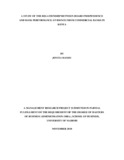| dc.contributor.author | Mandu, Jovita | |
| dc.date.accessioned | 2012-11-13T12:37:29Z | |
| dc.date.available | 2012-11-13T12:37:29Z | |
| dc.date.issued | 2010 | |
| dc.identifier.uri | http://erepository.uonbi.ac.ke:8080/handle/123456789/5748 | |
| dc.description.abstract | The main objective of this paper was to examine the relationship between measures of board independence and the financial performance of commercial banks in Kenya. The specific objectives were to ascertain the extent to which firm performance is influenced by the tenure of CEO; to investigate whether or not there is a significant relationship between the proportion of outside directors on the board and firm performance; and to assess the influence of audit committee structure on firm performance. This was a cross-sectional survey. A cross sectional survey was selected because it enabled data to be collected across several respondents at the same time.
The target population was all the 45 commercial banks in Kenya operating within Nairobi. From the population, all the commercial banks were to be used in the study but data for only 36 firms was available during analysis hence were used during analysis. Data for the period 2004 through 2008 were obtained from the annual financial reports of commercial banks in Kenya. There were basically two categories of variables for this study. On the one hand were measures of firm performance: ROA. On the other hand were measures of board independence along with some control variables.
The measures of board independence were: CEO tenure; proportion of outside directors on the board and audit committee. Two methods of data analysis were employed and the results were therefore divided into two to reflect this categorisation. The first type of analysis was descriptive analysis, which provided some averages of relevant variables. The second method of analysis was regression analysis.
The study found that CEO tenure has a positive significant influence on performance of smaller firm. It was also noted that board composition affects performance of smaller firms.
The study also found that firm performance is not significantly influenced by audit committee structure. The study therefore concludes that CEO tenure has a significant positive influence on firm performance, especially for smaller firms. It is also concluded that board composition has a significant negative correlation with performance of smaller firms and not for larger firms. The study further concludes that audit committee structure does not have a significant influence on bank performance.
The study recommends that there is need for small firms to take cognizance of the fact that CEO tenure may have a major influence on their performance. The shareholders should always strive to ensure that good CEOs are retained in the firms for as long as they are deemed fit for the job if the firms are to ensure constant better financial results. It is also recommended that smaller firms should keep the number of board members at a regulatory minimum since additional outsiders may hamper firm financial results. There is need to carry out more research on board independence especially for large firms to establish what board characteristics determine their performance. | en_US |
| dc.language.iso | en_US | en_US |
| dc.publisher | University of Nairobi, Kenya | en_US |
| dc.title | A study of the relationship between board independence and bank performance: evidence from commercial banks in Kenya | en_US |
| dc.title.alternative | Thesis (MBA) | en_US |
| dc.type | Thesis | en_US |

